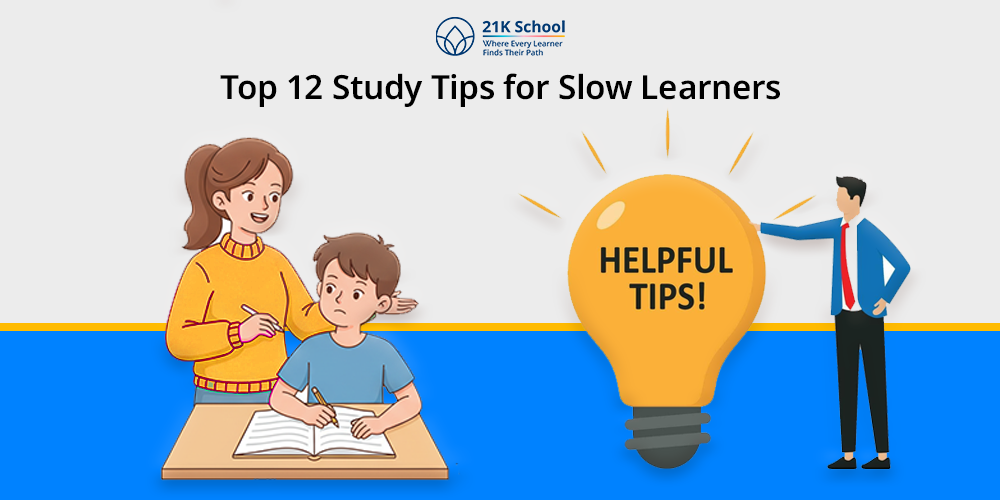
So, how do slow learners become fast learners? Here are some amazing study tips.
Slow learners have trouble studying but academic success is possible with the right mindset. Slow learners learn more slowly than other students.
But students can do better academically too if they develop the right strategies and habits. You get disciplined by a routine and your brain gets ready for focused learning.
Parents and teachers should help slow learners learn better. A slow learner may have no low IQ but has trouble understanding or memorising information.
Who are Slow Learners?
Slow learners learn more slowly than their peers. That does not make them stupid or unable. They might need more time, practice and support to learn and retain information.
Many slow learners are average in intelligence but struggle with attention, memory, language or other cognitive learning skills that affect their academic performance.
Read on to learn more about improving a childs academic performance .
They need individualized instruction, a patient learning environment and teaching methods adapted to their pace and style of learning . With encouragement and help, slow learners can succeed and feel good about themselves.
Slow learners can become independent, academically successful adults – intelligence & potential malleable with a little help.
Explore how to identify slow learners and ways to help them improve .
Top 12 Study Tips for Slow Learners
With practice and patience slow learners become confident and masterful. But slow learners can not communicate with others or study either. If they have good strategies and tactics they can learn. For general application, see the 12 practical study tips below.
1. Repetition
Slow learners need repetition, as it is an effective strategy. It creates neural pathways and stores information that is easily lost.
Instead of rote learning students could revise material in several short sessions, with notes reviewed daily or weekly in different situations. Hence, they overcome short-term memory problems and turn vague knowledge into long-term memory.
2. Cooperative Learning
Slow learners who need social support might like group activities with peers who are less lonely.
So problems are reduced to models of problem solving without solo performance pressure on the student – less student stress /anxiety.
3. Seek Guidance
If you get in trouble, ask teachers or professionals for help. Ask your teachers, mentors or relatives for explanations if you get stuck. Slow learners sometimes want to know something their faster peers don’t know.
That avoids little misunderstandings of any content and it’s emotionally reassuring. It also really helps to have a teacher-student relationship .
4. Remove Distraction
Slow learners may need a concentrated environment; they have short attention spans and don’t hear noises or interruptions well. Make your own study area – no TVs or phones, no social media – just a quiet corner without visuals and comfy seating.
Understand how to increase attention span .
A positive learning environment and less distractions make study time better spent and retention better as well as less tired.
5. Set Realistic Goals
Small wins break big tasks down slow learners avoid burnout, and celebrate small wins, not comparing themselves to others.
With that strategy you get a growth mindset , you go beyond natural ability and you go for bigger goals like more self-esteem and persistence.
6. Tutoring
Pacing and explanations that slow learners may not get in standard classrooms are not always available in one on one tutoring!
Regular tutoring speeds learning and reveals patterns of underlying difficulties that prepare learners for independent study and academic self-confidence.
7. Practice Question Paper
Past papers/sample questions are like exams for slow learners who need more practice with question formats.
With all this repeated practice you will remember better when you are under pressure to take tests and put theory into practice – and real assessments will be less scary.
8. Personalised Learning
Adapted methods work best with slow learners who like relevant but not generic approaches.
Personalised learning takes into account different processing styles for education, fun, effective, and self-advocate for resources chosen based on motivations.
9. Chunking and Scaffolding
Great ideas break things down in bite-sized chunks for slow learners and scaffold them for less scary learning.
That has cognitive overload/clear path to success-so learners know they are moving forward – without getting lost; problem-solving skills .
10. Visual Aids
Diagrams and charts as well as mind maps and videos can be used for verbal or abstract learning. Most slow learners process visual information better than text. So you make it real and memorable by linking things spatially with these aids.
Coming back often for reviews & annotations of visuals that link passive reading to active visualisation for memory and comprehension.
11. Positive Learning Environment
Positive learning environments build resilience, reduce study stress and encourage learners to keep going – for more fun and more study.
Keep going! Give yourself encouragement and positive energy to overcome the low self-esteem that slow learners develop from repeated setbacks.
12. Memory Techniques
Mnemonics, acronyms and association games help slow learners remember things. You can do games or quizzes everyday to practise memorisation.
Eventually all of these techniques strip away rote limitations so you can recall more and be more confident about information-heavy topics.
Ending Note
Slow learners become successful students with adapted study methods . In academics they will need patience, repetition & help from teachers / parents / peers.
With these tips you have focus and confidence to keep learning – and a basis for lifelong learning ! Slow learning isn’t a weakness! learn anyway. That’s another route to success.
Slow learners in education are just slow learners – that is not their capacity. Sometimes they need extra support to live in the environment.
